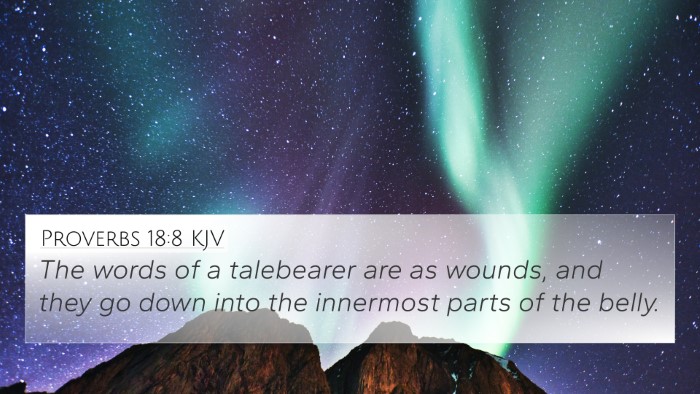Understanding Proverbs 26:22
Proverbs 26:22 states: "The words of a talebearer are as wounds, and they go down into the innermost parts of the belly." This verse highlights the destructive nature of gossip and the painful effects that such words can have on individuals. To gain a deeper understanding, we can draw insights from prominent public domain commentaries, including Matthew Henry, Albert Barnes, and Adam Clarke.
Verse Analysis
At its core, Proverbs 26:22 serves as a warning against the dangers of slander and gossip, often referred to as "talebearing." The metaphor of wounds illustrates how damaging these words can be, likening them to cuts that penetrate deeply, affecting one's heart and spirit.
Matthew Henry's Commentary
Matthew Henry emphasizes the grievous nature of a talebearer. He describes their words as not only harmful but also as bringing forth severe repercussions. According to Henry, the act of talebearing is akin to inflicting a wound that remains and festers, leading to potential bitterness and strife in relationships. He accentuates the idea that the innate need to share gossip stems from a more profound human flaw—curiosity and an inclination towards negativity.
Albert Barnes' Commentary
Albert Barnes expands upon this notion with his take on the language used. He suggests that talebearers are insidious because they appear to offer information, yet the truth of their words often leads to pain or distress. Barnes states that these words "go down into the innermost parts," signifying the deep emotional and psychological impact gossip can wield. He encourages readers to be mindful of their speech, suggesting that they should cultivate a lifestyle that promotes healing rather than harm.
Adam Clarke's Commentary
Adam Clarke also addresses the profound impact of gossip. He draws attention to the phrase "innermost parts," interpreting it as the depths of the human soul, where thoughts and feelings reside. Clarke notes that the harm inflicted by gossip can shape not only the present moment but also long-term emotional health. He implores believers to weigh their words carefully to avoid becoming vessels for harm.
Cross-Referencing Related Bible Verses
To better understand the ramifications of this verse, here are seven significant cross-references from Scripture that delve into similar themes regarding speech, gossip, and relational health:
- Proverbs 18:8: "The words of a talebearer are as wounds, and they go down into the innermost parts of the belly."
- James 3:5-6: "Even so the tongue is a little member, and boasts great things. See how great a forest a little fire kindles!"
- Proverbs 20:19: "He who goes about as a talebearer reveals secrets; therefore do not associate with one who flatters with his lips."
- Psalms 15:3: "He who does not backbite with his tongue, nor does evil to his neighbor, nor takes up a reproach against his friend."
- Proverbs 10:18: "Whoever hides hatred has lying lips, and whoever spreads slander is a fool."
- Proverbs 12:18: "There is one who speaks like the piercings of a sword, but the tongue of the wise promotes health."
- Proverbs 26:20: "Where there is no wood, the fire goes out; and where there is no talebearer, strife ceases."
Thematic Connections
The themes surrounding Proverbs 26:22 highlight the seriousness of the words we speak and the moral responsibility that comes with communication. The verse correlates with broader Biblical teachings on speech and conflict resolution, emphasizing the importance of purity in our words.
Comparative Insights
By engaging in a comparative Bible verse analysis, we see that the principles laid out in Proverbs resonate throughout both the Old and New Testaments. Jesus teaches the principle of treating others with kindness in Matthew 7:12, known as the Golden Rule, which dovetails with the ethos of avoiding harmful speech.
Connecting Verses
In addition to the aforementioned verses, we can also reference:
- Luke 6:31: "And just as you want men to do to you, you also do to them likewise."
- Ephesians 4:29: "Let no corrupt word proceed out of your mouth, but what is good for necessary edification, that it may impart grace to the hearers."
Conclusion
In conclusion, Proverbs 26:22 serves as a powerful reminder of the weight our words can carry. The interconnectedness of Biblical texts through cross-referencing deepens our understanding and encourages a more virtuous approach to communication. By applying these insights and themes, believers can actively seek to foster an environment that nurtures understanding and compassion, counteracting the wounds that slander and gossip inflict.
Tools for Further Study
For those interested in more extensive study, consider employing Bible reference resources, such as Bible concordances or cross-reference guides. Understanding how to use Bible cross-references can enhance your devotional practices and insights during Bible study, allowing for a richer and more nuanced understanding of the Scriptures.





